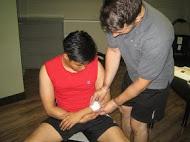Eczema is a skin condition that results to the development of dense, flaking red patches on the skin and severe itching. It can affect individuals of all ages as well as babies. Some people with eczema are lucky that their condition vanishes once they reach maturity, but others have it all their lives. Eczema can be treated with changes in the lifestyles and applying topical creams. As a common skin disorder, you should learn how to provide the appropriate first aid measures if eczema is suspected.
Treatment for eczema

- Keep the skin moisturized, even if there are no flare-ups. Use unscented soap and lotion every time when taking a bath. This helps in protecting the skin from irritants and itchiness as well as reduces discomfort.
- There are foods that should be avoided such as nuts, cow’s milk or fish. Most cases of eczema are aggravated by using strong soaps that strips the moisture of the skin, also the perfumes in cosmetics, detergents and soaps. Other cases that trigger eczema are pet dander or dust mites.
- Use the prescribed medicated creams if over-the-counter cream is not effective. Some creams for eczema contains corticosteroids, and some new creams contains pimecrolimus or tacrolimus that are good for eczema when steroids do not work or causing bad side effects.
- If the person who has eczema has difficulty sleeping because of the itchiness, take antihistamines. They are used during severe flare-ups of eczema to help individuals enjoy better sleep and prevent them from infecting the eczema patches with their uncontrollable scratching.
- If eczema is very severe, use oral steroid under a doctor’ supervision. Oral steroids suppress a serious inflammation.
- Take immunosuppressant drugs if the eczema does not respond to steroids or changes in lifestyles. The doctor will monitor the patient while using these drugs since it can cause colds, infections and some types of cancer.
Eczema can also be treated using sea salt
Using sea salt for skin treatments helps to exfoliate dead skin cells and restores damaged skin. Sea salt helps reduce pain, inflammation, improves circulation and cell regeneration as well as hydrates the tissues.
- Choose a high quality, unrefined sea salt since it contains the greatest amount of minerals. They can be very expensive, just buy in bulk to save money. A large grain sea salt is good for external use and can be grounded for cooking and seasoning.
- Make a sea salt scrub to minimize the symptoms of eczema and for exfoliation of dead skin cells. Ingredients for healing sea salt scrub include 4 tbsp. large grain sea salt, 1 tbsp. ground bay leaf, 2 tbsp. sweet almond oil and 10 drops of lavender essential oil. Mix all the ingredients and keep in a jar with a tight fitting cover. Massage the scrub into problems areas and rinsing them with warm water.
- In a warm bath tub add 1 to 2 cups of sea salt, and soak to help minimize eczema symptoms. It removes dirt and oils from the skin, then add 15 to 20 drops of lavender essential oils to the tub to add more soothing effects on the eczema.
- Treat open wounds caused by eczema by mixing ½ tsp. of sea salt with 1 cup warm water. Soak a clean cloth in the solution and place it over the irritated skin for 10 minutes. Repeat this procedure three or four times every day.
